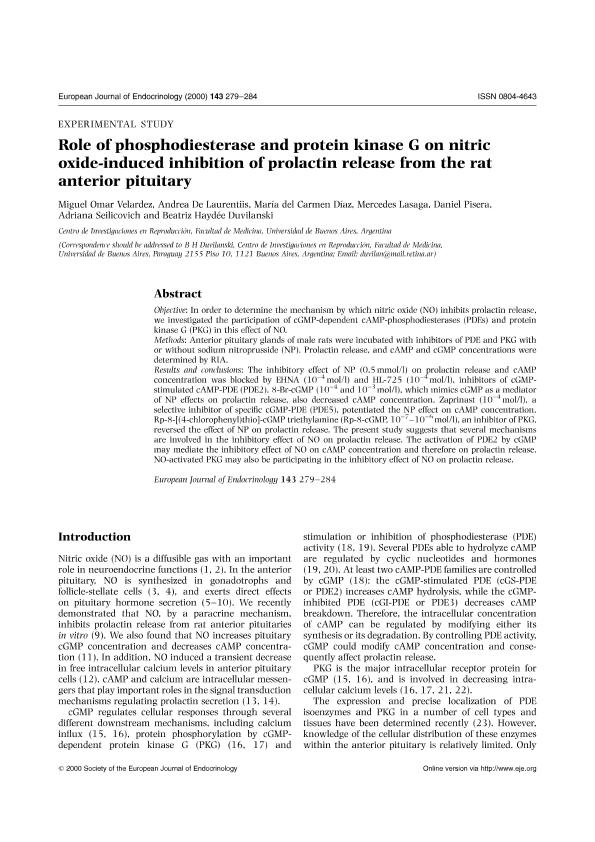Artículo
Role of phosphidiesterase and protein kinase G on nitric oxide-induced inhibition of prolactin release from the rat anterior pituitary
Velardez, Miguel Omar ; de Laurentiis, Andrea
; de Laurentiis, Andrea ; Díaz, María del Carmen; Lasaga, Mercedes Isabel
; Díaz, María del Carmen; Lasaga, Mercedes Isabel ; Pisera, Daniel Alberto
; Pisera, Daniel Alberto ; Seilicovich, Adriana
; Seilicovich, Adriana ; Duvilanski, Beatriz Haydee
; Duvilanski, Beatriz Haydee
 ; de Laurentiis, Andrea
; de Laurentiis, Andrea ; Díaz, María del Carmen; Lasaga, Mercedes Isabel
; Díaz, María del Carmen; Lasaga, Mercedes Isabel ; Pisera, Daniel Alberto
; Pisera, Daniel Alberto ; Seilicovich, Adriana
; Seilicovich, Adriana ; Duvilanski, Beatriz Haydee
; Duvilanski, Beatriz Haydee
Fecha de publicación:
08/2000
Editorial:
BioScientifica
Revista:
European Journal of Endocrinology
ISSN:
0804-4643
Idioma:
Inglés
Tipo de recurso:
Artículo publicado
Clasificación temática:
Resumen
Objective: In order to determine the mechanism by which nitric oxide (NO) inhibits prolactin release, we investigated the participation of cGMP-dependent cAMP-phosphodiesterases (PDEs) and protein kinase G (PKG) in this effect of NO. Methods: Anterior pituitary glands of male rats were incubated with inhibitors of PDE and PKG with or without sodium nitroprusside (NP). Prolactin release, and cAMP and cGMP concentrations were determined by RIA. Results and conclusions: The inhibitory effect of NP (0.5 mmol/l) on prolactin release and cAMP concentration was blocked by EHNA (10±4 mol/l) and HL-725 (10±4 mol/l), inhibitors of cGMPstimulated cAMP-PDE (PDE2). 8-Br-cGMP (10±4 and 10±3 mol/l), which mimics cGMP as a mediator of NP effects on prolactin release, also decreased cAMP concentration. Zaprinast (10±4 mol/l), a selective inhibitor of speci®c cGMP-PDE (PDE5), potentiated the NP effect on cAMP concentration. Rp-8-[(4-chlorophenyl)thio]-cGMP triethylamine (Rp-8-cGMP, 10±7±10±6 mol/l), an inhibitor of PKG, reversed the effect of NP on prolactin release. The present study suggests that several mechanisms are involved in the inhibitory effect of NO on prolactin release. The activation of PDE2 by cGMP may mediate the inhibitory effect of NO on cAMP concentration and therefore on prolactin release. NO-activated PKG may also be participating in the inhibitory effect of NO on prolactin release.
Palabras clave:
Protein Kinase G
,
Nitric Oxide
,
Prolactin
,
Pituitary
Archivos asociados
Licencia
Identificadores
Colecciones
Articulos(BIOMED)
Articulos de INSTITUTO DE INVESTIGACIONES BIOMEDICAS
Articulos de INSTITUTO DE INVESTIGACIONES BIOMEDICAS
Articulos(INBIOMED)
Articulos de INSTITUTO DE INVESTIGACIONES BIOMEDICAS
Articulos de INSTITUTO DE INVESTIGACIONES BIOMEDICAS
Articulos(OCA HOUSSAY)
Articulos de OFICINA DE COORDINACION ADMINISTRATIVA HOUSSAY
Articulos de OFICINA DE COORDINACION ADMINISTRATIVA HOUSSAY
Citación
Velardez, Miguel Omar; de Laurentiis, Andrea; Díaz, María del Carmen; Lasaga, Mercedes Isabel; Pisera, Daniel Alberto; et al.; Role of phosphidiesterase and protein kinase G on nitric oxide-induced inhibition of prolactin release from the rat anterior pituitary; BioScientifica; European Journal of Endocrinology; 143; 2; 8-2000; 279-284
Compartir



